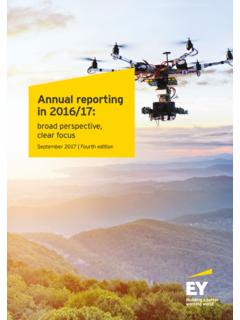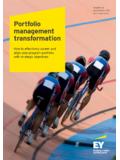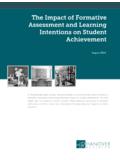Transcription of Developments for Revenue Recognition debates ...
1 Issue 85 / July 2014 IFRS Developments Joint Transition Resource Group for Revenue Recognition debates implementation issues What you need to know At its inaugural meeting, the TRG discussed implementation issues relating to: gross versus net Revenue presentation; royalties on licensed intellectual property; and impairment of capitalised contract costs. The Boards intend to use the TRG s discussions to determine whether additional application guidance or interpretation is needed for entities to apply IFRS 15 consistently. The TRG did not take any votes or summarise its views. The Boards plan to provide a status update on issues the TRG discussed on or before the TRG s next meeting on 31 October 2014. Overview At its inaugural meeting, the Joint Transition Resource Group for Revenue Recognition (TRG) discussed four implementation issues that stakeholders have raised regarding the joint Revenue Recognition standard the International Accounting Standards Board (IASB) and the US Financial Accounting Standards Board (FASB) (collectively, the Boards) issued recently, IFRS 15 Revenue from Contracts with Customers.
2 The Boards created the TRG to help them determine whether more application guidance or interpretation is needed. The TRG will not make formal recommendations to the Boards or issue any application guidance. Instead, the TRG will discuss the issues and highlight the challenges, and the Boards will determine the actions to be taken on each issue. A replay of the meeting is available on the IASB s and FASB s websites, and minutes will be made available in the future. Members of the TRG include financial statement preparers, auditors and users from a variety of industries, countries and entities. Members of the Boards and observers from the International Organisation of Securities Commissions, US Public Company Accounting Oversight Board and US Securities and Exchange Commission also attended the meeting.
3 The goal of the TRG is to inform the Boards whether further application guidance or interpretation is needed on IFRS 15. 2 Joint Transition Resource Group for Revenue Recognition debates implementation issues implementation issues discussed Gross versus net Revenue intangible goods or services The TRG discussed issues involving intangible (or virtual) goods or services when there are more than two parties in an arrangement. Examples include hosted application software ( , online games), website advertising space distributed through advertising exchanges, e-tickets or vouchers for events or travel services, and electronic gift cards. IFRS 15 requires an entity to determine whether it is a principal or an agent in a transaction by evaluating the nature of its promise to the An entity is a principal (and, therefore, records Revenue on a gross basis) if it controls the promised good or service before transferring it to the customer.
4 An entity is an agent (and records as Revenue the net amount it retains as a commission) if its only role is to arrange for another entity to provide the goods or services. Problems arise because it is difficult to determine which party controls an intangible good or service prior to its transfer to the customer and it is not always clear which party is the customer. For example, an online game developer s customer might be the intermediary that hosts the game on its network or platform or the end-consumer. The TRG discussed these issues in some detail, but did not reach a consensus. The standard lists indicators of when an entity is acting as an agent,2 but judgement is needed to apply them to intangible goods or services because they were written in the context of tangible goods.
5 Some TRG members felt the indicator relating to inventory risk would never be relevant to arrangements involving intangible goods. Others thought it could be applied by analogy when an entity enters into non-cancellable or non-refundable arrangements with the producer of an intangible good. The TRG also debated whether some indicators should be given more weight than others. IFRS 15 does not state that any one indicator is more determinative than another, which is similar to current IFRS. One member commented that certain indicators may be more determinative than others, but weighting them in the same manner for all arrangements would not make sense because facts and circumstances would dictate which indicators should be weighted more heavily.
6 Evaluating whether an entity is a principal or an agent can also be complicated if the entity does not know the gross amount billed to the end-consumer. That might be the case if the entity has a contract with an intermediary that is paid by the end-consumer and then pays the entity only the amount it is owed. The TRG discussed four views on this topic,3 but the TRG did not reach a consensus. TRG members also discussed two ways a discount could be allocated in an arrangement in which the entity is a principal for some performance obligations and an agent for others. In one way, any discount would be allocated to each performance obligation, regardless of whether the entity acts as an agent or a principal. In the second way, the discount would only be applied to the performance obligations for which the entity acts as a principal.
7 One TRG member felt the facts and circumstances of an arrangement likely would make the determination clear. How we see it Under IAS 18 Revenue , determining whether to present gross or net Revenue for the sale of intangible goods or services is challenging and requires significant judgement. Under IFRS 15, this determination will continue to be difficult. As this topic generated the most discussion and diversity in thinking, we hope the Boards will provide more application guidance. 1 IFRS 2 IFRS 3 TRG Agenda Paper 1 available on the IASB s website: Joint Transition Resource Group for Revenue Recognition debates implementation issues 3 Gross versus net Revenue amounts billed to customers The TRG discussed whether certain items billed to customers ( , shipping and handling, reimbursement of out-of-pocket expenses, and taxes) should be presented as Revenue or as a reduction of costs.
8 Paragraph 47 of IFRS 15 states that any amounts collected on behalf of third parties (for example, some sales taxes) must be excluded from the transaction price. Several TRG members noted that this would require entities to evaluate taxes collected in all jurisdictions in which they operate to determine whether a tax is levied on the entity or the customer. Some TRG members thought any amounts not collected on behalf of third parties should be included in the transaction price ( , Revenue ). This would be consistent with the standard s definition of transaction price, which includes amounts billed to a customer if those amounts represent consideration to which an entity expects to be entitled in exchange for transferring goods or services to a customer.
9 4 That is, if the amounts were incurred by the entity in fulfilling its performance obligations, they are included in the transaction price and recorded as Revenue . Other TRG members said an entity applies the principal versus agent application guidance when it is not clear whether the amounts are collected on behalf of third parties. This could result in amounts billed to a customer being recorded as an offset to costs incurred, even when the amounts are not collected on behalf of third parties. An additional question was raised about whether the act of shipping a good should be considered a separate performance obligation and whether the shipping terms ( , FOB origin, FOB destination) affect this determination. Sales and usage-based royalties for licences of intellectual property The TRG discussed issues involving sales and usage-based royalties for licences of intellectual property (IP) which, under IFRS 15, are recognised at the later of when the sale or usage occurs or when the entity satisfies the performance obligation to which some or all of the royalty has been allocated.
10 This treatment is an exception to the accounting for other forms of variable consideration, which are estimated at contract inception and potentially included in the transaction price when control transfers to the customer. The TRG discussed whether this exception would apply to royalties that relate to both licensed IP and other goods or services in an arrangement or royalties that relate to licensed IP that is accounted for together with other goods or services. An example of the former is a contract with two performance obligations, such as a distinct franchise licence and consulting or training services that would be provided over time and would affect the amount of royalties earned. An example of the latter would be a contract with a software licence that allows the customer to embed the licensor s software in its products, but also includes significant upfront customisation services that would require the arrangement to be bundled into one performance obligation.












